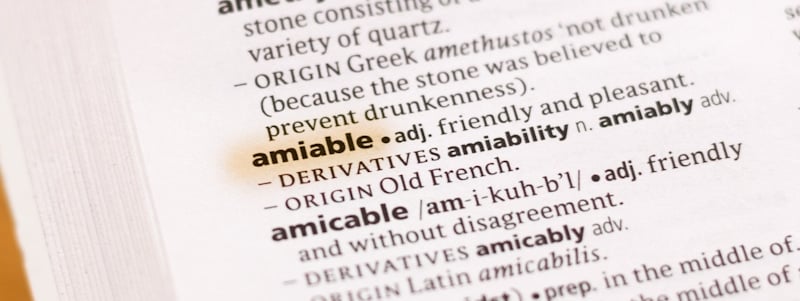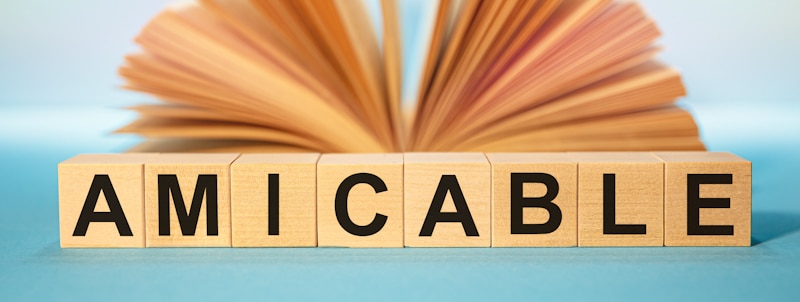We all want to write and communicate well in the English language, but there are some confusions that we must clear out to do that. The English language has many words with similar spellings, though these words have different meanings, and differentiating them might be complicated. You’re must be wondering, should we say “amiable” or “amicable”? When and how to use them in a sentence.
The word “amiable” is an adjective that describes the friendly disposition of a person. “Amicable” also performs the functions of an adjective in a sentence. It is the act of goodwill, being peaceable, benevolence, and friendliness among two or more people or a group.
Though there is still a lot to be learned using these words, we will explain the differences, similarities, and variations in their detailed usage.

When and How to Use the Word “Amiable” in a Sentence
We will begin by discussing when to and how to use the word “amiable” in a sentence. To understand this accurately, we need to break it down by diving into the origin and the meaning of the word. This is because every language’s words can be appropriately used when the etymology or origin and meaning is understood.
In discussing the origin of a word, we are talking about where the word was coined. Many English words have their origin from French, Spanish, Latin, Greek, and Germanic words.
Regarding the meaning of a word, we are talking about what the word infers or connotes; it is what the word implied in the context it is read. This is the easiest thing you will learn about a word, and it is also the easiest to remember and apply.
Now, we have established the foundation of the origin and meaning of a word. So, we will talk about the origin and meaning of the word “amiable”?
The word “amiable” is gotten from the Middle English word “amyable” from an Old French word “amiable” (this means worth to be loved), which is also from the Late Latin word “amīcābilis” (meaning friendly). Amīcābilis is from the Latin word “amicus” (meaning friend), which in turn is from “amō” (that means I love). Over years of usage, the French word “amiable” and the Latin word “amābilis” (which means loveable) has dramatically influenced the meaning of the English word “amiable.”
The word “amiable” means friendly, likable, cordial, congenial, sociable, is used to describe situations that turn out well and a nice thing. It refers to showing or having a pleasant, good-natured personal quality. Inanimate things that cause joy, happiness, and turn out to be better than envisioned can also be described using the word “amiable.”
Some of the synonyms of the word “amiable” are: pleasant, kind, agreeable, pleasing, lovable, affable, genial, good-humored, charming, conversable, hospitable, convivial, couthy, and companionable. The antonyms of “amiable” include ill-natured, unfriendly, ill-tempered, gruff, unlovely, unamiable, sullen, surly, hateful, cruel, and crusty.
Now, here are some illustrative examples that detail the use of this word.
- He was able to have many people attend his birthday celebration because he has an amiable disposition.
- We were able to deduce she had an amiable personality from the writings we found after her demise.
- Underneath his amiable personality lies inexhaustible intellectual energy, drive, and curiosity.
- He was honorable in every way in his private life, upright, amiable, devoid of all envy, and charitable to the fault.
- The meeting’s mood was so amiable that the panel could quickly come to a point of agreement.
- It is easier to be successful and popular by keeping an amiable behavior than seeking to please only yourself.
- He expected the worst from his meeting with his supervisor; on the contrary, it was an amiable encounter.
When “amiable” functions as a noun in a sentence, it becomes “amiability.” Amiability is the quality or state of being friendly and pleasant. Here are some examples that show the use of the word “amiability” in a sentence.
- His courage, his loyalty, and his amiability to the cause make him a lovely and responsible figure.
- He inherited some of his highly gifted mother’s talent; his amiability and handsome features made him very popular in college.
- By making quality education available to all, people can learn lots of virtues, including generosity, friendliness, love, patience, amiability, and temperance.

When and How to Use the Word “Amicable” in a Sentence
Having established when and how to use the word “amiable” in a sentence correctly, we will study when and how to use the word “amicable” in a sentence. As we have done earlier, we will examine the origin and meaning of the word.
In case you have forgotten, the origin, also referred to as etymology, is where a word is coined out from, which in most cases is from words of other languages. And the meaning of the word refers to the idea passed out when used, and every word has an idea it conveys to a reader.
Now that we have recalled your memory, let us look at the origin and meaning of the word “amicable.”
The word “amicable” is coined out from the Late Latin word “amīcābilis” (this means friendly) gotten from the Latin word “amicus” (meaning friend), ultimately gotten from the Latin word “amare” (which in turn means love).
Now, what is the meaning of the word “amicable”?
It gets a little complicated here; both words “amiable” and “amicable” have a very similar meaning but just a slight difference. You must know that little difference so you can use the words accurately.
We use “amicable” to describe civil and peaceful relations and interactions between people. It is also used to describe a desire to avoid conflict and settle things in a very peaceful manner. It also refers to the benevolence or friendly disposition between two or more people or groups.
We will take a look at the synonyms and antonyms of the word “amicable.”
The synonyms of “amicable” are: agreeable, congenial, harmonious, unanimous, united, empathic, neighborly, peaceful, polite, civil, cordial, courteous, conflict-free, easy-going, good-natured, fraternal, cozy, and sociable. The antonyms of “amicable” include uncivil, unrefined, hostile, rude, impolite, disagreeable, unmannerly, reclusive, and unfriendly.
Here are some examples showing the usage of the word in a sentence.
- The disputes between Great Britain and her Caribbean colonies reached a point where there was no possibility of an amicable agreement.
- Although the policeman showed his amicable disposition towards the two culprits, he still had to issue a citation to both individuals.
- She confirmed that the negotiations with the contractors and investors were very amicable, and all parties were willing to get the deal done.
- After been engaged in a civil war for more than three years, both sides made a peaceful agreement, and they reached another amicable agreement five years later.
- If there is no amicable agreement, then an independent ombudsman must be brought on board to settle the matter.
- The divorce was amicable, and the couple decided to remain friendly for the sake of their children.
When you want to use “amicable” as an adverb in a sentence, it becomes “amicably,” to use it as a noun, and it becomes “amicability.”
Amicably refers to doing something in a peaceful and friendly manner, without arguments, misunderstanding, or unpleasant behavior. A few examples of the usage of amicably in sentences are below.
- As much as he was ready to take his abuser to court, he was advised otherwise, and they resolved it amicably.
- Incidents involving naval authorities at sea will escalate into full-blown confrontations if not settled amicably.
Amicability means having a disposition characterized by friendliness and warmth. It also means having a disinclination to quarrel or engage in confrontations. We will give some examples of how you use amicability in sentences.
- The company had no choice but to rely on his efficiency, amicability, loyalty, and wisdom to discharge his duties.
- Parents must instill virtues like amicability, compassion, empathy, loyalty, benevolence, and love in their children as they grow.

Understanding the Difference Between Both Words
As we have explained, there are similarities between both words. First, there is a typical Latin word in the etymology of both words. And both words have similar synonyms and antonyms.
It is important to note that the difference in spelling out both words is the “C” in “amicable.” Another difference that you must be aware of is that we use “amiable” to describe a person’s personality, but “amicable” describes terrible situations that are now better.
Final Thoughts
Deciding which word to use between “amiable” and “amicable” can confuse most people because of the similarities in spelling and meaning, but there are differences in usage.
We have cleared up all the confusion in this article. We have explained in detail the proper use of each word with examples. So, read up and enjoy.
Shawn Manaher is the founder and CEO of The Content Authority. He’s one part content manager, one part writing ninja organizer, and two parts leader of top content creators. You don’t even want to know what he calls pancakes.

